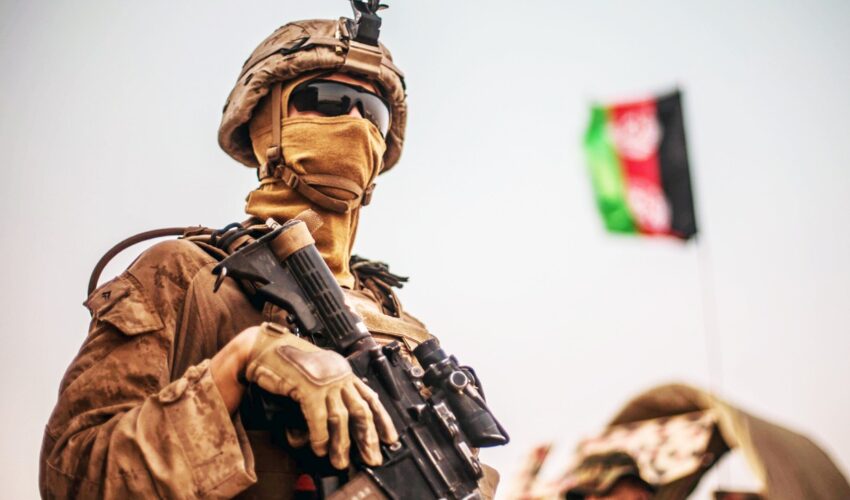Afghanistan Off the United States National Security Priorities

An Incorrect Impression or a Reality?
The prevailing narrative inside and outside Afghanistan is that the United States and its allies have forgotten Afghanistan. Most Afghan socio-political activists get the impression from their meetings with the American authorities that the United States no longer takes Afghanistan as a security-military priority. Therefore, most former Afghan politicians, non-Taliban political and military groups, political analysts, and other elites believe and amplify the narrative that Afghanistan is no longer on the security and military agenda of the United States. They project that the Afghanistan crisis has been reduced to just a developing humanitarian crisis in the agenda of most Western countries. Whether that is an incorrect impression or a true narrative should be assessed in greater detail.
Reviewing the historical context upon which that narrative has been shaped is critical. In the hundred years since Afghanistan gained its independence from Great Britain, its history indicates that every significant political and security development in Afghanistan has always been an outcome of foreign interventions. Thus, all key Afghan players look for new indications that can help get past the situation in the country.
For example, the Soviet war in Afghanistan started in 1979 and ended in 1989. The Soviet army marched into Afghanistan to support the ruling People’s Democratic Party of Afghanistan following waves of insurgency against the government it supported. Soviet soldiers fought alongside the allied Afghan National Army against anti-government militant groups collectively known as the “Afghan Mujahideen,” primarily supported by the United States, United Kingdom, Pakistan, Saudi Arabia, and Egypt. The Soviet Union finally withdrew its troops from Afghanistan in 1989.
Likewise, countries in the region and beyond have been key players in the Afghan civil wars of 1992 – 1996, the Taliban takeover of Kabul in 1996, and, from 1996 to 2001, the first resistance against the Taliban. Ultimately, the Taliban’s removal from power only happened when the United States, authorized by the UN, launched a significant military intervention in 2001. As such, countries in the region and beyond have always had a prominent and decisive role in determining who should rule Kabul and how that vision can be materialized. Even in return to the power of the Taliban in 2021, the role of foreign countries is undeniable. If the disarray of internal players is one of the factors that facilitated the return of the Taliban to power, the West’s interaction and legitimization of the Taliban, the signing of the Doha Agreement, and finally, the marginalization of the then-Afghan government by its allies were undoubtedly other determining factors.
The re-establishment of Taliban rule over Afghanistan after twenty years of relative stability and the formation of a monopolistic de-facto administration composed of Taliban fighters has caused great disappointment among the people of Afghanistan and the politicians inside and outside of Afghanistan. In addition, imposing strict Sharia laws, erasing women from all aspects of social life, isolating Afghanistan, collapsing the economy, and finally intensifying the humanitarian disaster in the country faced unambiguous opposition from all socio-political groups inside and outside of Afghanistan.
At the same time, the collapse of the Republic and the dispersion of Afghan political forces worldwide have caused each of these groups to seek to influence the situation in Afghanistan individually. To achieve the goal of transforming the internal condition of Afghanistan, these groups chose many different approaches. Some started armed opposition, some created political and social movements, and some appealed to foreign countries for support. All these groups and movements have one point in common: the inherent need to secure the support of foreign countries. There are several reasons for their apparent need and dependence on one or more foreign countries. First, practically, socio-political or military opposition to the Taliban will be strenuous without securing some political legitimacy and essential material resources. Second, gaining the support of one of the countries in the region or beyond will construct a centrality for a party or movement. And finally, Afghan movements will succeed in achieving their goals only if they secure a geographic base to operate from. Therefore, most Afghan socio-political and military movements and parties seek to unite with one of the countries to acquire the necessary support and resources.
The point to be pondered in this regard is that none of the countries in the region has so far shown signs of cooperation or facilitation of the socio-political and military movements formed outside of Afghanistan. Other countries, such as the Gulf and Western countries, look up to the United States to adjust and articulate their Afghanistan policy in light of the policy and approach adopted by the United States. In other words, considering the 20 years of solid and dominant US presence in Afghanistan, the rest of the world’s engagement in Afghanistan will generally be influenced by the United States’ policy and approach. This is why no country in the region or beyond agreed to host one of the Afghan movements.
United States policy and approach is detrimental to shaping other countries’ interaction and engagement with Afghan socio-political forces. The prominent role of the United States in shaping other countries’ interaction with Afghan parties has caused most Afghan people, parties, and socio-political movements to expect more activism from the United States. However, as stated in its 2023 national security strategy, the United States has had many other competing priorities in recent years, significantly undermining Afghanistan’s place as an important element of its foreign policy. Russia’s invasion of Ukraine, China’s threat to invade Taiwan, and economic competition with China are far more strategically important for the United States. The evident fall-off of Afghanistan’s place in the US security-military policy priorities has caused a significant loss of morale and momentum among Afghan socio-political activists and undermined the aspiration to promote local resistance inside Afghanistan.
Although the United States Department of State still appointed an office of special representative for Afghanistan peace and an office of special representative for Afghan women and carried out several public diplomacy programs, the US lack of interest in direct and meaningful interaction with non-Taliban Afghan political forces impelled more frustration and dissatisfaction among the socio-political stratum of Afghanistan. While regional countries do not have the will or capacity to host non-Taliban political movements, most socio-political activists believe that the success of their programs depends on the support of the West, with the United States being the linchpin. That is why the overall impression that Afghanistan has fallen off US security and priorities became mainstream.
But it is essential to consider that throughout history, after every significant political event, most forces will need time to find and establish coherence and determine their new direction. The United States, which has been involved in Afghanistan, from supporting the Republic to interacting with the Taliban and facilitating intra-Afghan dialogue, is now in a situation where it needs to redefine how it interacts with the Taliban, non-Taliban political forces, and regional countries. It seems that the United States can bring more clarity as to what will be its policy in Afghanistan only after the emergence of a legitimate national movement that can adequately and genuinely represent the interests and priorities of the Afghan people.
Afghanistan can return to the US security priorities when Afghan parties and movements form a legitimate national movement, inclusive of all Afghan parties, to establish an inclusive system of governance acceptable to the majority of the Afghan people. There remains an essential question for the US authorities: whether or not they will wait until the Afghan socio-political movements give up on the US and turn to other directions (Russia, China, Iran). In that case, the United States must also be willing to accept that it has lost its dominant and decisive place when it comes to Afghan security and politics.

Barakat Rahmati

Nazeela Elmi

Ahmad H. Najmpoor





